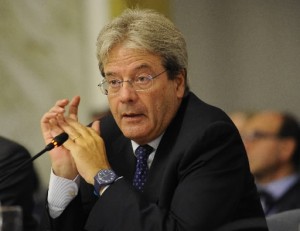Foreign ministers’ meeting in Hiroshima: Written interview with Paolo Gentiloni, Italy’s minister of foreign affairs
Apr. 8, 2016
What hopes do you have for the foreign ministers’ meeting?
Prime Minister Shinzo Abe has vowed to strengthen the G7 as a “community of values” and Italy will stand squarely by his side. In a world that grows increasingly chaotic, the G7 should convey a message of peace, solidarity, and respect for the rules-based international order.
What would you like to discuss to strengthen peace in the world?
We will need to address the key threats to international peace and security. North Africa and the wider Middle East are in turmoil, but we also see some cause for hope. The Iran nuclear deal (by six nations including the U.S. and European countries) has become a success story of preventive diplomacy. A ceasefire, albeit fragile, is finally in place in Syria. The Libyan political process is no longer in a stalemate. Territories controlled by the militant group known as the Islamic State are shrinking.
Dialogue and concerted efforts with all relevant actors have been instrumental in achieving these results; complemented, when needed, by shared military efforts. We should build on these developments and start planning for peace consolidation. Economic rehabilitation should be quick and effective.
Most crucially from a European perspective, our response to the plight of refugees – but also to migrants, who are not invaders, but fellow humans who flee extreme poverty – should be based on humanity and shared responsibility.
Do you support “a world without nuclear weapons”?
Italy fully shares (with other nations) the goal of a peaceful and secure world free of nuclear weapons. The presence of international political leaders in Hiroshima serves both as a reminder of our solemn responsibility for future generations, and spur for our endeavors aimed at creating the conditions for a world without nuclear weapons.
The promotion of international stability as well as the full implementation of the non-proliferation obligations are essential in order to produce an international environment conducive to a world without nuclear weapons. The nuclear weapon states bear fundamental responsibilities. At the same time, both nuclear weapon states and non-nuclear weapon states must cooperate to ensure the conditions for disarmament. This is possible only within inclusive processes based on confidence and trust.
Do you have any suggestions as to what the youth of Hiroshima can do to promote peace?
As citizens of the first place in the world to experience the catastrophic consequences of an atomic bomb, the youth of Hiroshima should keep this memory alive on behalf of the victims and help the international community in reaffirming that this terrible experience should never happen again.
(Originally published on April 8, 2016)
Read the full interview here.
Prime Minister Shinzo Abe has vowed to strengthen the G7 as a “community of values” and Italy will stand squarely by his side. In a world that grows increasingly chaotic, the G7 should convey a message of peace, solidarity, and respect for the rules-based international order.
What would you like to discuss to strengthen peace in the world?
We will need to address the key threats to international peace and security. North Africa and the wider Middle East are in turmoil, but we also see some cause for hope. The Iran nuclear deal (by six nations including the U.S. and European countries) has become a success story of preventive diplomacy. A ceasefire, albeit fragile, is finally in place in Syria. The Libyan political process is no longer in a stalemate. Territories controlled by the militant group known as the Islamic State are shrinking.
Dialogue and concerted efforts with all relevant actors have been instrumental in achieving these results; complemented, when needed, by shared military efforts. We should build on these developments and start planning for peace consolidation. Economic rehabilitation should be quick and effective.
Most crucially from a European perspective, our response to the plight of refugees – but also to migrants, who are not invaders, but fellow humans who flee extreme poverty – should be based on humanity and shared responsibility.
Do you support “a world without nuclear weapons”?
Italy fully shares (with other nations) the goal of a peaceful and secure world free of nuclear weapons. The presence of international political leaders in Hiroshima serves both as a reminder of our solemn responsibility for future generations, and spur for our endeavors aimed at creating the conditions for a world without nuclear weapons.
The promotion of international stability as well as the full implementation of the non-proliferation obligations are essential in order to produce an international environment conducive to a world without nuclear weapons. The nuclear weapon states bear fundamental responsibilities. At the same time, both nuclear weapon states and non-nuclear weapon states must cooperate to ensure the conditions for disarmament. This is possible only within inclusive processes based on confidence and trust.
Do you have any suggestions as to what the youth of Hiroshima can do to promote peace?
As citizens of the first place in the world to experience the catastrophic consequences of an atomic bomb, the youth of Hiroshima should keep this memory alive on behalf of the victims and help the international community in reaffirming that this terrible experience should never happen again.
(Originally published on April 8, 2016)
Read the full interview here.








